May 24, 2025 | 15:45 GMT +7
May 24, 2025 | 15:45 GMT +7
Hotline: 0913.378.918
May 24, 2025 | 15:45 GMT +7
Hotline: 0913.378.918
The Vietnamese Fruit Festival is be held in Beijing, China, for two days, from September 29 to 30, under the collaboration of the Ministry of Agriculture and Rural Development and the Ministry of Industry and Trade.
The festival, which is supported by the Embassy of the Socialist Republic of Vietnam to China, the Vietnam Fruit & Vegetable Association (Vinafruit), and Chinese partners, takes place under the theme "Vietnamese fruit- Four-season delicacy."
The participation of numerous major Vietnamese agricultural processing and export enterprises, as well as agricultural industry associations, importers, and distributors from China, marks the inaugural holding of a large-scale fruit festival abroad.
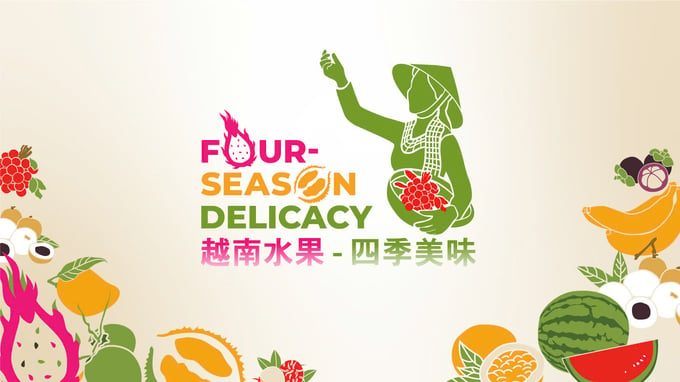
The participation of numerous major Vietnamese agricultural processing and export enterprises, as well as agricultural industry associations, importers, and distributors from China, marks the inaugural holding of a large-scale fruit festival abroad.
It is anticipated that the festival will serve as one of the primary trade promotion events designed to increase the export of fresh fruits and root products, as well as processed products made from fruits and roots that are officially permitted for export to the Chinese market.
Xinfadi Agricultural Product Distribution Center, located in Beijing's Fentai District, will host the festival. This wholesale market is the largest in Beijing and distributes all legally imported fruits from around the globe. The Xinfadi Center is responsible for the requirements of more than 22 million residents in Beijing, as well as those of neighboring regions such as Hubei Province and Tianjin City.
Modern chilled storage facilities, transport, and preservation equipment for fresh fruits are available at the center, which is home to numerous reputable and large-scale fruit distribution enterprises in China.
The primary area of the festival will include an exhibit area with 12 islands, which will showcase themed products, including a variety of fruits and sweet potatoes that have been officially exported to China. Furthermore, a comprehensive product area will be present on one island, enabling Vietnamese businesses to exhibit, introduce, and provide visitors with an opportunity to experience their products.
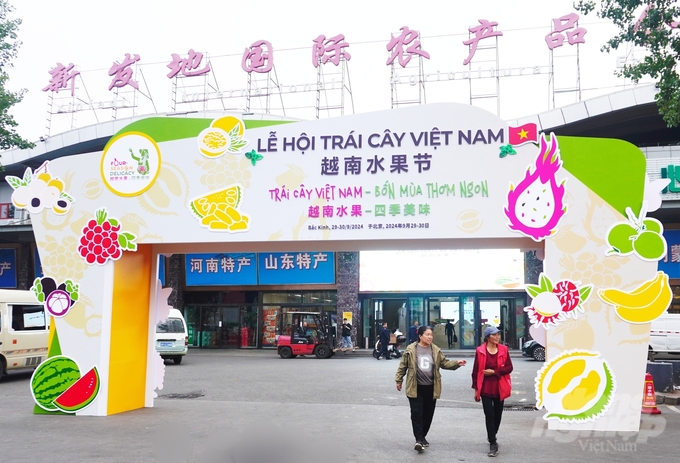
The fruit festival is scheduled to take place from September 29-30 in Beijing, China. Photo: Hong Tham.
The promotional message for Vietnamese fruits in this country of over 1.4 billion people is "Vietnamese Fruits – Four-season delicacy," which highlights the distinctive flavors of Vietnamese fruits throughout all four seasons in contrast to fruits that are not grown in such distinct climates and soils as those in Vietnam.
The festival will host numerous seminars to disseminate information regarding the production and trade capabilities of fresh fruit and vegetable products, as well as direct business encounters between Vietnamese enterprises and Chinese fruit importers and distributors. Additionally, initiatives for product experience will be structured.
The festival is a continuation of the accomplishments of General Secretary and President To Lam's state visit to China from August 18 to 20.
The festival was promptly organized within a month and was in conjunction with the 13th Economic and Trade Cooperation Committee meeting between Vietnam and China, which was hosted by the Ministry of Industry and Trade and the Chinese Ministry of Commerce in Beijing, at the initiative of Minister of Agriculture and Rural Development Le Minh Hoan.
Beijing is a high-value market with substantial demand, as it is the capital and the political, economic, and cultural center of all of China. Mr. Hoa stated that the objective of the Fruit Festival in Beijing is to enhance the brand and image of Vietnam's nutritious and delectable tropical fruits, thereby attracting the attention and involvement of a diverse array of Chinese and international businesses.
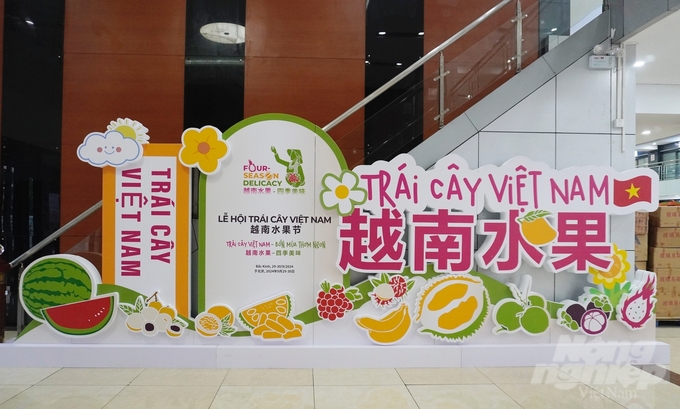
The festival is a great opportunity for Vietnamese producers and suppliers to introduce and promote their fruit brands and images, as well as seek customers and strengthen trade activities. Photo: Hong Tham.
Vietnamese producers and suppliers have the opportunity to introduce and promote their fruit brands and images, as well as to seek customers and strengthen trade activities, according to Mr. Le Thanh Hoa, Deputy Director of the Department of Quality, Processing, and Market Development (MARD).
In the future, this event will serve as a foundation and experience for the organization of more specialized festivals on a regular basis, not only in Beijing but also in northern provinces and cities of China. This will facilitate the connection and expansion of Vietnamese fruit exports to the Chinese market, as well as neighboring countries such as Russia, Mongolia, Japan, and South Korea.
China has been Vietnam's main trading partner for an extended period. Approximately one-quarter of Vietnam's total import-export value with the globe is reflective of the total bilateral trade turnover between Vietnam and China. In contrast, Vietnam is the largest trading associate of China on a global scale and the largest within ASEAN.
In recent years, there has been a positive evolution in the trade relations between China and Vietnam. In August 2024, General Secretary and President To Lam visited China, and the two nations signed three protocols regarding quarantining frozen durian, fresh coconut, and crocodile products. This is particularly noteworthy.
Fruits and vegetables are among the primary export categories of Vietnam to China, and they are currently experiencing substantial growth. The export value of Vietnam's fruits and vegetables to China in the first six months of 2024 amounted to USD 2.1 billion, which accounted for approximately 64% of the total export value of fruits and vegetables worldwide.
Consumers have developed a strong affinity for various fruit and vegetable products and brands in China, such as durian, longan, and avocados.
Although Vietnamese fruits are highly regarded for their quality and volume, they have primarily been exported through cross-border and small-scale trade, predominantly to southern Chinese provinces that border Vietnam, such as Guangxi and Yunnan.
Therefore, the Ministry of Agriculture and Rural Development, the Ministry of Industry and Trade, and associated agencies are committed to promoting the official export of Vietnamese fruits and marketing initiatives that will improve the image and branding. Vietnamese fruits will be able to penetrate the Chinese market more deeply and generate higher value as a result of this sustainable export development strategy.
Translated by Linh Linh
/2025/05/22/5250-1-184853_288.jpg)
(VAN) According to a representative from the Central Retail Vietnam, Vietnamese products such as seafood, sweet potatoes, dragon fruit, coffee, and spices hold great potential in the Thai market.
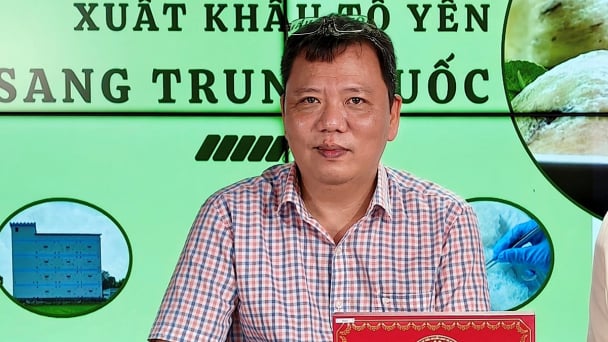
(VAN) A multi-channel, multi-directional strategy only works when the agricultural value chain meets global transparency and SPS standards.
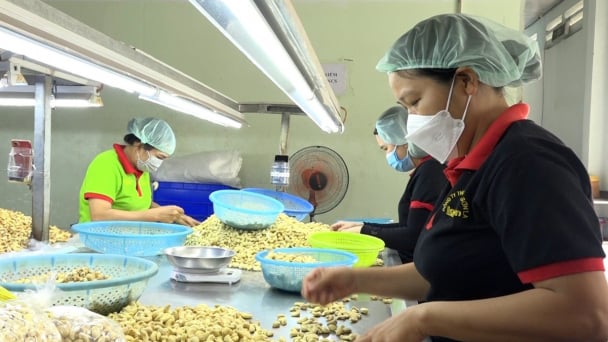
(VAN) Market expansion is a matter of survival for Vietnamese businesses amid fierce competition and global supply chain fluctuations.
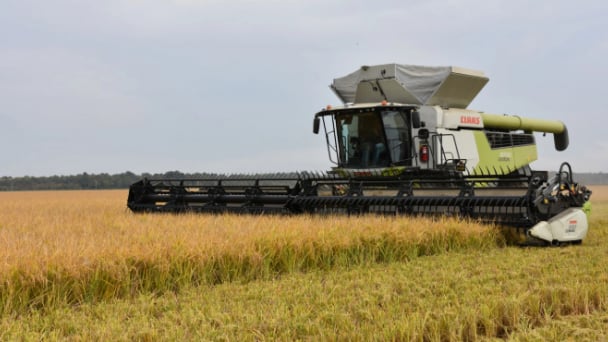
(VAN) Global market prospects for U.S. long-grain rice for the upcoming marketing year.
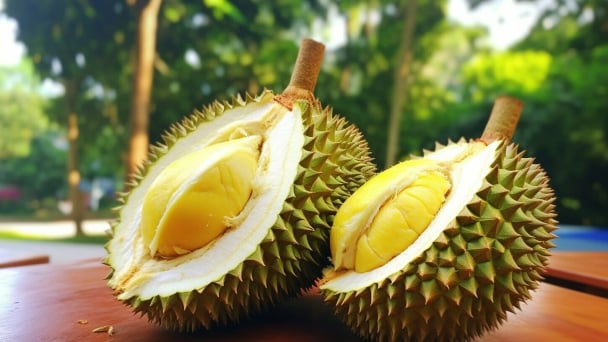
(VAN) China’s General Administration of Customs started permitting fresh durian shipments from Cambodia after a phytosanitary protocol was signed with the Cambodian Ministry of Agriculture in late April.
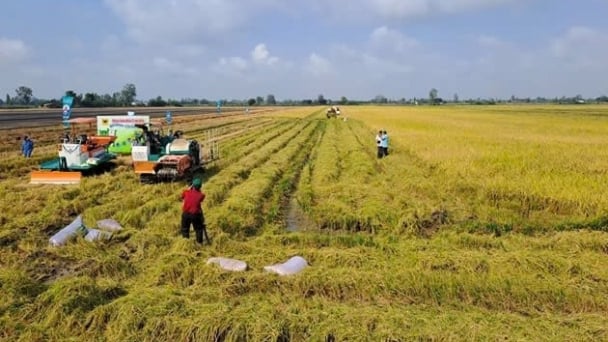
(VAN) To operate carbon market, one of the key issues is determining which types of 'commodities' meet the standards to be traded on the market.
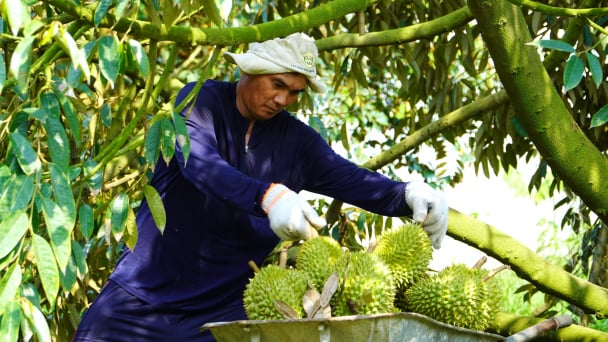
(VAN) Durian-producing localities need to coordinate more effectively with central authorities to improve the traceability, monitoring, and response systems in case of violations.